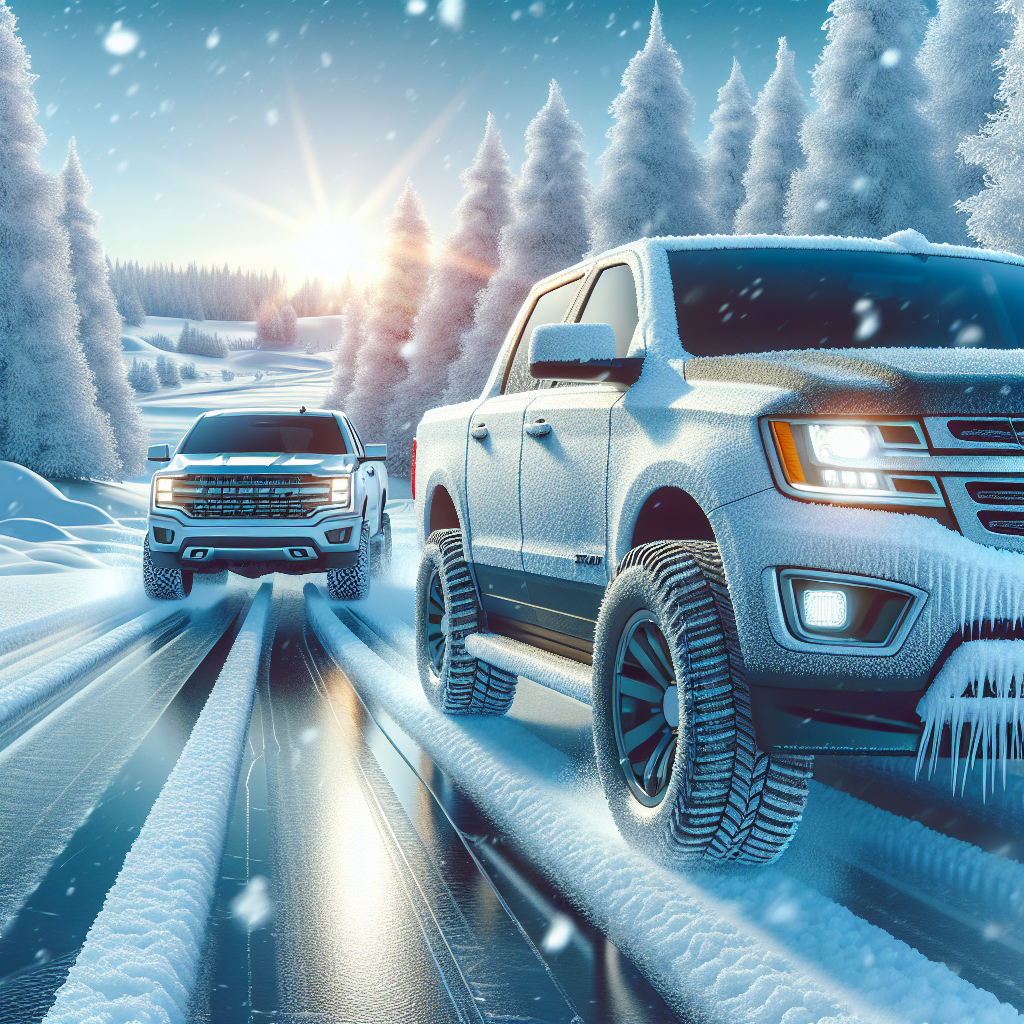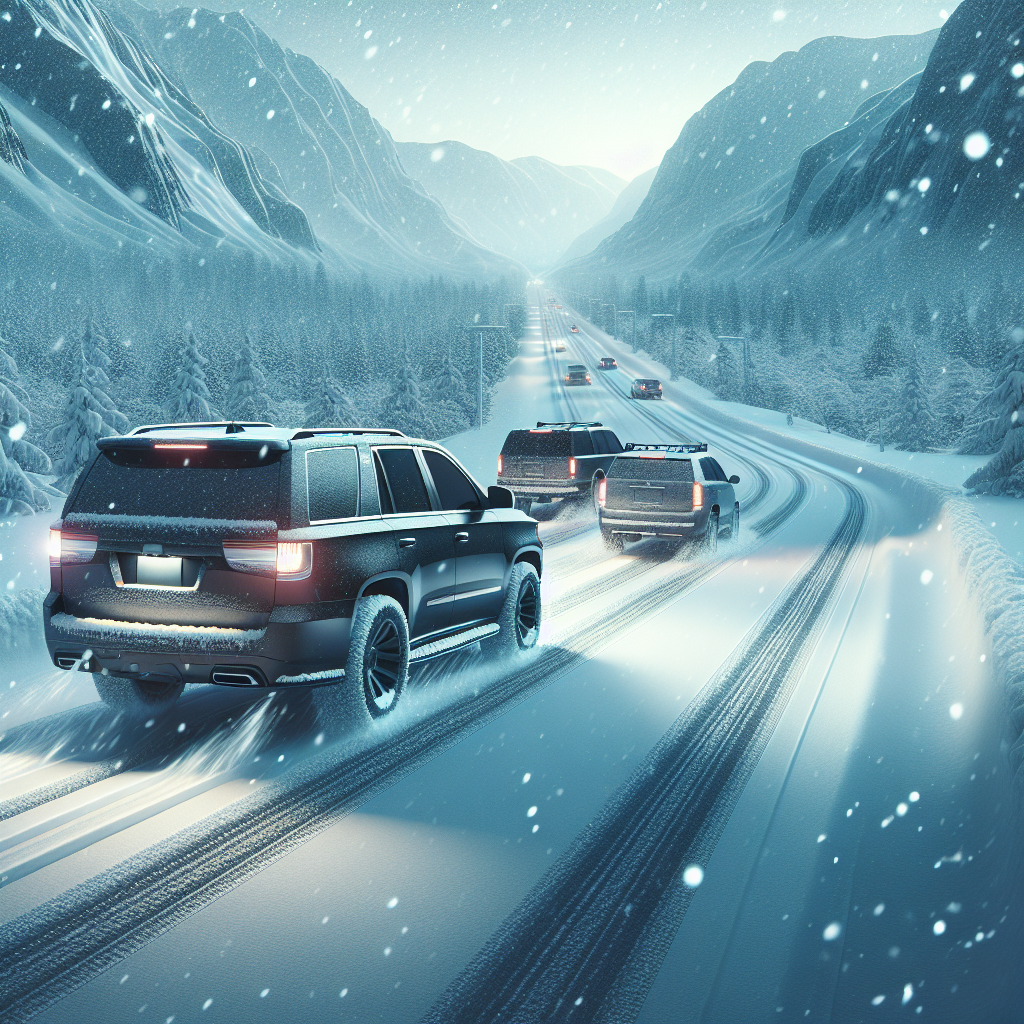Did you know that winter tires are not one size fits all? When it comes to SUVs and trucks, having tires that are specifically designed for winter conditions is crucial for your safety on the road. Whether it’s navigating through icy terrain or maintaining traction on snowy roads, having the right tires can make all the difference. In this article, we will explore the options available for SUVs and trucks when it comes to winter tires, ensuring you have the knowledge to make the best decision for your vehicle. So buckle up, because we’re about to take a closer look at the world of winter tires for SUVs and trucks.

What are winter tires?
Definition and purpose of winter tires
Winter tires, also known as snow tires, are specifically designed to provide better traction and control in cold weather conditions, including snow, ice, and slush. They are made with special rubber compounds that remain flexible even in low temperatures, allowing them to grip the road effectively. The tread pattern on winter tires is deeper and more aggressive than that of regular tires, which helps to channel away snow and water, improving traction and reducing the risk of hydroplaning.
Key features of winter tires
Winter tires come with several key features that make them ideal for tackling winter road conditions. These features include:
-
Deep tread depth: Winter tires have a deeper tread pattern compared to regular tires, allowing them to bite into snow and slush for improved traction.
-
Sipes: These are small slits or grooves in the tread blocks of the tire that provide additional biting edges. Sipes enhance grip on icy surfaces and improve braking performance.
-
Tread block design: The design of the tread blocks on winter tires is optimized for enhanced traction on snow and ice. They often feature zigzag or multidirectional patterns that help to grip the road surface.
-
Soft rubber compound: Winter tires are manufactured using a special rubber compound that remains soft and pliable in cold temperatures. This flexibility allows the tires to conform to the road surface and maintain grip.
-
Studdable or studless: Winter tires can be either studded or studless. Studded tires have metal studs embedded in the tread for even better traction on ice, while studless tires rely on their tread design and rubber compound for grip.
The importance of winter tires for SUVs and trucks
Challenges faced by SUVs and trucks in winter
SUVs and trucks face unique challenges during winter months due to their size, weight, and drivetrain. These challenges include:
-
Increased weight: SUVs and trucks are generally heavier than passenger cars, which can make them more prone to sliding and reduced control on slippery surfaces.
-
Higher ground clearance: The increased ground clearance of SUVs and trucks can affect their stability on icy roads, increasing the risk of accidents or loss of control.
-
Four-wheel drive: Many SUVs and trucks come equipped with four-wheel drive systems, which provide greater traction and control. However, four-wheel drive alone is not enough to compensate for the limitations of all-season tires in harsh winter conditions.
Benefits of using winter tires for SUVs and trucks
Using winter tires on SUVs and trucks can provide several important benefits:
-
Improved traction: Winter tires are specifically designed to grip the road in snowy and icy conditions. They offer superior traction, reducing the risk of sliding and increasing overall control.
-
Enhanced braking performance: Winter tires have shorter stopping distances on cold, snowy, or icy surfaces. This can be especially crucial when driving larger vehicles like SUVs and trucks, which take longer to stop due to their weight.
-
Better handling and stability: Winter tires’ aggressive tread pattern and optimized design help to improve handling and stability, even in challenging winter conditions. This allows SUV and truck drivers to maintain better control while navigating slippery roads.
-
Increased safety: By providing superior traction, braking performance, and stability, winter tires can significantly increase the safety of SUVs and trucks during winter driving. They reduce the chances of accidents and improve overall road safety for both the occupants of these vehicles and other road users.
Considerations when choosing winter tires for SUVs and trucks
Choosing the right winter tires for SUVs and trucks involves considering several important factors. These factors include:
Tire size and load capacity
It is crucial to choose winter tires that are the correct size for your SUV or truck. Refer to the vehicle’s owner’s manual or the tire placard located on the driver’s door jamb for the recommended tire size. Additionally, consider the load capacity of the tires, especially if you frequently carry heavy loads or tow trailers with your vehicle.
Tread pattern and design
The tread pattern and design of winter tires play a crucial role in their performance. Look for tires with an aggressive tread pattern that features deep grooves and plenty of sipes. This design helps to improve traction on snow and ice, while also channeling away water and slush for better control and reduced aquaplaning.
Tire compound and performance
Winter tires are made with different rubber compounds than regular tires to remain flexible in cold temperatures. Look for tires with a high silica content in the rubber compound, as this helps to maintain grip on icy surfaces. Additionally, consider the tire’s performance characteristics, such as its responsiveness, cornering ability, and overall performance ratings.
Studded vs. studless winter tires
One important consideration is whether to choose studded or studless winter tires. Studded tires have metal studs embedded in the tread, providing excellent traction on icy surfaces. However, they can be noisy and are typically not allowed on all roads. Studless winter tires rely on their tread pattern and rubber compound for grip, making them suitable for various winter conditions while offering a quieter ride.
Tire certifications and ratings
Look for winter tires that have been certified by reputable organizations such as the Rubber Manufacturers Association (RMA), the Rubber Association of Canada (RAC), or the International Organization for Standardization (ISO). These certifications ensure that the tires meet specific performance and quality standards. Additionally, consider the tire’s speed rating, load index, and traction rating, as these provide valuable information about the tire’s capabilities.
Top winter tire brands for SUVs and trucks
When it comes to choosing the best winter tires for your SUV or truck, several top brands have proven track records:
Brand A
Brand A is known for its high-quality winter tires that offer excellent traction on snow and ice. Their tires are designed to provide optimal performance in wintery conditions, ensuring maximum safety and control for SUV and truck drivers.
Brand B
Brand B has a strong reputation for producing durable and reliable winter tires for SUVs and trucks. Their tires feature innovative tread designs and advanced rubber compounds, providing superior traction and stability on icy surfaces.
Brand C
Brand C offers a wide range of winter tires specifically designed for SUVs and trucks. Their tires are known for their excellent handling, braking performance, and durability. They prioritize safety without compromising on comfort and stability.
Brand D
Brand D is renowned for producing high-performance winter tires that excel in extreme winter conditions. Their tires are designed to provide excellent traction on snow, ice, and slush, making them a reliable choice for SUV and truck owners.
Brand E
Brand E is known for its technologically advanced winter tires that deliver exceptional performance in cold weather. Their tires feature cutting-edge tread patterns and rubber compounds, ensuring optimal grip and control for SUV and truck drivers.

Features to look for in winter tires for SUVs and trucks
When choosing winter tires for your SUV or truck, consider the following features:
Aggressive tread design
Look for winter tires with an aggressive tread pattern that has deep grooves and plenty of sipes. These features provide enhanced traction on snow and ice, improving overall control and stability.
Enhanced traction on snow and ice
Winter tires should have excellent traction on snow and ice to ensure maximum safety when driving in winter conditions. Look for tires that have been tested and rated for their performance in these specific conditions.
Optimized handling and stability
Choose winter tires that offer optimized handling and stability. This includes responsive steering and cornering capabilities, ensuring that your vehicle remains stable even on slippery roads.
Excellent braking performance
Braking performance is crucial when driving in winter conditions, especially for larger vehicles like SUVs and trucks. Look for winter tires that have been tested and rated for their braking performance on snow and ice.
Durable construction for heavy vehicles
SUVs and trucks are generally heavier than passenger cars, so it’s important to choose winter tires that are capable of carrying the weight of these vehicles. Look for tires with a high load capacity rating and a durable construction that can withstand the demands of heavier vehicles.
Installation and maintenance tips for winter tires on SUVs and trucks
Proper installation and maintenance of winter tires are essential to ensure their longevity and performance. Follow these tips for installing and maintaining winter tires on your SUV or truck:
Proper installation by a professional
It’s recommended to have your winter tires installed by a professional tire technician. They have the expertise and equipment to ensure the tires are mounted correctly, minimizing the risk of damage or improper fitment.
Checking tire pressure and tread depth regularly
Regularly check the tire pressure of your winter tires using a reliable tire pressure gauge. Properly inflated tires provide optimal performance and control. Additionally, check the tread depth regularly to ensure it meets the minimum legal requirement and to gauge the overall condition of your tires.
Rotating tires for even wear
To promote even wear and extend the lifespan of your winter tires, it’s advisable to rotate them at regular intervals. This ensures that the tires wear evenly and that their performance remains consistent throughout their lifespan.
Storing winter tires during offseason
When winter is over, it’s important to store your winter tires properly to maintain their quality. Store them in a cool, dry place away from direct sunlight, and consider using tire bags or covers to protect them from dust and debris.
Replacing winter tires when necessary
Monitor the condition of your winter tires and replace them when their tread depth reaches the recommended minimum or when signs of damage or wear are visible. Winter tires that are worn or damaged will not provide adequate traction and should be replaced promptly.

Best practices for driving with winter tires on SUVs and trucks
While having winter tires on your SUV or truck provides significant benefits, it’s important to follow these best practices when driving in winter conditions:
Adjusting driving habits in winter conditions
When driving with winter tires, it’s important to adjust your driving habits to suit the road conditions. Drive at a safe speed, leave a larger following distance, and anticipate potential hazards.
Maintaining a safe speed and distance
Reduce your speed when driving in wintery conditions to allow for increased stopping distances. Maintain a safe distance from the vehicle in front of you to provide ample time to react and stop if needed.
Avoiding sudden acceleration, braking, and turns
Winter tires improve traction and control, but sudden acceleration, braking, and turns can still lead to loss of control. Practice smooth and gentle controls to maintain stability and reduce the risk of skidding or sliding.
Using additional winter driving techniques
In addition to having winter tires, familiarize yourself with additional winter driving techniques such as using your vehicle’s four-wheel drive system correctly, understanding how to recover from a skid, and knowing how to navigate icy or snowy road conditions.
Knowing the limitations of winter tires
While winter tires provide improved traction and control, they are not a guarantee for invincibility. It’s important to understand that even with winter tires, there are still limitations when driving in extreme weather conditions. Always exercise caution and use common sense when driving in challenging winter conditions.
Cost considerations for winter tires for SUVs and trucks
Price range of winter tires for SUVs and trucks
The cost of winter tires for SUVs and trucks can vary significantly depending on the brand, tire size, and specific features. On average, winter tires for SUVs and trucks can range from $100 to $300 per tire. This price range is a rough estimate, and it’s important to budget accordingly and consider the long-term benefits and safety advantages.
Long-term cost benefits of using winter tires
While winter tires may require an initial investment, they can provide long-term cost benefits. Winter tires offer increased safety, which can reduce the risk of accidents, vehicle damage, and potential injuries. Additionally, winter tires may contribute to better fuel efficiency and can potentially extend the lifespan of other components of your SUV or truck, such as the braking system.
Factors affecting the cost of winter tires
Several factors can impact the cost of winter tires for SUVs and trucks. These factors include the tire brand, tire size, tread design, rubber compound, and additional features such as studding. When considering the cost of winter tires, it’s important to prioritize safety and performance rather than solely focusing on price.

Frequently asked questions about winter tires for SUVs and trucks
Q1: Are winter tires necessary for SUVs and trucks?
Yes, winter tires are highly recommended for SUVs and trucks, especially if you live in an area with significant winter weather. Winter tires provide improved traction, control, and safety in snowy and icy conditions, reducing the risk of accidents and providing peace of mind.
Q2: Can I use regular all-season tires for winter driving?
While all-season tires offer some degree of performance in winter conditions, they are not specifically designed for the snow and ice. All-season tires may become less effective or provide inadequate traction in extreme winter conditions. Winter tires are specifically engineered to perform optimally in cold weather and should be used for the best safety and control.
Q3: Do winter tires affect fuel efficiency of SUVs and trucks?
In general, winter tires may have a slightly higher rolling resistance compared to regular tires due to their deeper tread and softer rubber. This can lead to a marginal decrease in fuel efficiency. However, the impact on fuel consumption is usually minimal, and the safety benefits of winter tires often outweigh any minor decrease in fuel efficiency.
Q4: How often should winter tires be replaced?
The lifespan of winter tires can vary depending on various factors such as driving conditions, mileage, maintenance, and tire quality. On average, winter tires should be replaced every six years, even if they appear to have sufficient tread depth. Additionally, if the tread depth reaches the minimum legal requirement or if signs of wear or damage are present, it’s important to replace the tires promptly.
Q5: Can I use winter tires year-round on my SUV or truck?
While winter tires provide excellent performance in cold conditions, they are not suitable for year-round use. Winter tires have specific tread patterns and rubber compounds that are optimized for winter conditions. Using winter tires in warm weather can lead to accelerated wear, reduced fuel efficiency, and compromised handling. It’s recommended to switch back to all-season or summer tires once winter conditions have passed.
Conclusion
Winter tires are an essential investment for SUV and truck owners who regularly face challenging winter conditions. These specialized tires offer improved traction, control, and safety, providing peace of mind on snow, ice, and slush-covered roads. When choosing winter tires for your SUV or truck, consider factors such as tire size, tread pattern, tire compound, and certifications. By selecting the right winter tires and practicing safe driving habits, you can confidently navigate winter roads and ensure the safety of yourself, your passengers, and other road users. Remember to follow proper installation and maintenance procedures to maximize the longevity and performance of your winter tires. Stay safe, and enjoy the winter season with the improved performance of winter tires on your SUV or truck.


